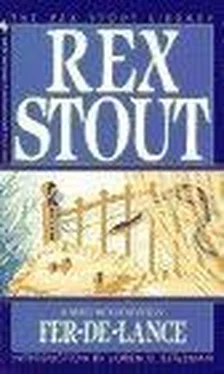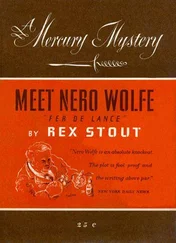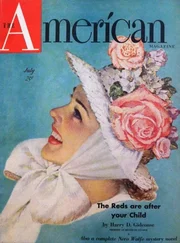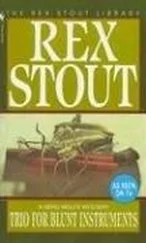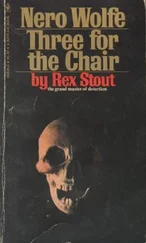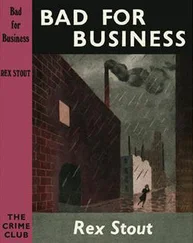Rex Stout - Fer-De-Lance
Здесь есть возможность читать онлайн «Rex Stout - Fer-De-Lance» — ознакомительный отрывок электронной книги совершенно бесплатно, а после прочтения отрывка купить полную версию. В некоторых случаях можно слушать аудио, скачать через торрент в формате fb2 и присутствует краткое содержание. Жанр: Старинная литература, en-GB. Описание произведения, (предисловие) а так же отзывы посетителей доступны на портале библиотеки ЛибКат.
- Название:Fer-De-Lance
- Автор:
- Жанр:
- Год:неизвестен
- ISBN:нет данных
- Рейтинг книги:5 / 5. Голосов: 1
-
Избранное:Добавить в избранное
- Отзывы:
-
Ваша оценка:
- 100
- 1
- 2
- 3
- 4
- 5
Fer-De-Lance: краткое содержание, описание и аннотация
Предлагаем к чтению аннотацию, описание, краткое содержание или предисловие (зависит от того, что написал сам автор книги «Fer-De-Lance»). Если вы не нашли необходимую информацию о книге — напишите в комментариях, мы постараемся отыскать её.
Fer-De-Lance — читать онлайн ознакомительный отрывок
Ниже представлен текст книги, разбитый по страницам. Система сохранения места последней прочитанной страницы, позволяет с удобством читать онлайн бесплатно книгу «Fer-De-Lance», без необходимости каждый раз заново искать на чём Вы остановились. Поставьте закладку, и сможете в любой момент перейти на страницу, на которой закончили чтение.
Интервал:
Закладка:
"You won't." Kimball looked pleased. "When anything's urgent I attend to it. The office has got along without me for a week; an hour more won't hurt them."
Wolfe nodded approvingly. "Will you have a glass of beer?"
"No, thanks. I don't drink."
"Ah." Wolfe pressed the button. "You're an extraordinary man, sir. You have learned to abstain, and you are at the same time a good businessman and a philosopher.-One glass, Fritz.-But we were speaking of injuries, and I was hovering on confession. Whom have I not injured? That of course is rhetorical; I would not pose as a ruffian; and I suffer from a romantic conscience. Even so, making all allowances, it is not easy for me to understand why I am still alive. Less than a year ago a man sitting in the chair you now occupy promised to kill me at his earliest convenience. I had pulled the foundations of his existence from under him from purely mercenary motives. There is a woman living not twenty blocks from here, and a remarkably intelligent one, whose appetite and disposition would be vastly improved by news of my death. I could continue these examples almost to infinity. But there are others more difficult to confess and more impossible to condone.-Thank you, Fritz."
Wolfe removed the opener from the drawer and opened a bottle and dropped the cap into the drawer before he closed it again. Then he filled a glass and gulped it down. Kimball was saying, "Of course every man has to take the risks of his profession."
Wolfe nodded. "That's the philosopher in you again. It is easy to see, Mr. Kimball, that you are a cultured and an educated man. Perhaps you will understand the obscure psychology which prompts- well, me, for instance-to persist in an action which deserves unqualified condemnation. There is a woman under this roof at this moment, living on the top floor of this building, who cannot wish me dead only because her heart is closed to venom by its own sweetness. I torture her daily, hourly. I know I do and that knowledge tortures me; still I persist. You can guess at the obscurity of the psychology and the depth of the torture when I tell you that the woman is my mother."
I got it all down as he said it, and I almost glanced up at him in surprise, he said it so convincingly, with little emotion in his voice but the impression that the feeling underneath was so overwhelming that it was kept down only by a determined will. For a second he darned near had me feeling sorry for his mother though it was I who, balancing the bank account each month, checked off the debit item for his remittance to her at her home in Budapest.
"Goodness gracious," Kimball said.
Wolfe downed another glass of beer and slowly shook his head from side to side. "You will understand why I can recite a category of injuries. I can justly claim familiarity."
It seemed to me that Kimball wasn't going to take the hint. He was looking sympathetic and self-satisfied. In fact, he smirked. "I'm wondering why you think I'm an educated man."
Wolfe's eyebrows went up. "Isn't it obvious?"
"It's a compliment if you think so. I quit school-out in Illinois-when I was twelve, and ran away from home. It wasn't much of a home, with an uncle and aunt. My parents were dead. I haven't been in a school since. If I'm educated it's self-education."
"Not the worst kind." Wolfe's voice was low and quiet, not much more than a murmur; the voice that he used to say "go on" without saying it. "You are another proof of it, sir. And New York is itself an education for a lad of that age if he had spirit and character."
"Probably. It might be, but I didn't come to New York. I went to Texas. After a year on the Panhandle, to Galveston, and from there to Brazil and the Argentine."
"Indeed! You did have spirit; and your education is cosmopolitan."
"Well, I covered a lot of territory. I was in South America twenty years, mostly in the Argentine. When I came back to the States I nearly had to go to school again to learn English. I've lived-well, I've lived a lot of funny ways. I've seen a lot of rough stuff and I've taken part in it, but wherever and whatever it was I always did one thing, I always stuck to the rules. When I came back to the States I was selling beef, but gradually I worked into grain. That was where I found myself; grain takes a man not afraid to guess and ready to ride his guess the way a gaucho rides a horse."
"You were a gaucho?"
"No, I've always been a trader. It was born in me. Now I wonder if you would believe this. Not that I'm ashamed of it; sitting in my office sometimes, with a dozen markets waiting to see which way I'm going to jump, I remember it and I'm proud of it. For two years I was a rope peddler."
"Not really."
"Yes. Three thousand miles a season in the saddle. I still show it when I walk."
Wolfe was looking at him admiringly. "A real nomad, Mr. Kimball. Of course you weren't married then."
"No. I married later, in Buenos Aires. I had an office then on the Avenida de Mayo-"
He stopped. Wolfe poured another glass of beer. Kimball was looking at him, but his eyes were following the movement without seeing it, for obviously the vision was inside. Something had pulled him up short and transported him to another scene.
Wolfe nodded at him and and murmured, "A memory-I know-"
Kimball nodded back. "Yes-a memory. That's a funny thing. Goodness gracious. It might almost seem as if I had thought of that on account of what you said about injuries. The different kinds, fancied injuries. Fatal injuries. But this wasn't one at all, the only injury was to me. And it wasn't fancied. But I have a conscience too, as you said you have, only I don't think there's anything romantic about it."
"The injury was to you."
"Yes. One of the worst injuries a man can suffer. It was thirty years ago, and it's still painful. I married a girl, a beautiful Argentine girl, and we had a baby boy. The boy was only two years old when I came home from a trip a day too early and found my best friend in my bed. The boy was on the floor with his toys. I stuck to the rules; I've told myself a thousand times that if I had it to do over I'd do it again. I shot twice-"
Wolfe murmured, "You killed them."
"I did. The blood ran onto the floor and got on one of the toys. I left the boy there-I've often wondered why I didn't shoot him too, since I was sure he wasn't mine-and went to a cafe and got drunk. That was the last time I drank…"
"You came to the States?"
"A little later, a month later. There was no question of escaping, you don't have to run away from that in the Argentine, but I wound things up and left South America for good, and I've only been back once, four years ago."
"You brought the boy with you?"
"No. That's what I went back for. Naturally I didnt want him, my wife's family took him. They lived out on the pampa, that's where I got her from. The boy's name was Manuel, and that had been my friend's name; I had suggested naming him after my friend. I came back alone, and for twenty-six years I lived alone, and I found the market a better wife than the one I had tried. But I suppose there was a doubt in me all the time, or maybe as a man gets older he softens up. Maybe I just got lonely, or maybe I wanted to persuade myself that I really had a son. Four years ago I got things in shape and went to Beunos Aires. I found him right away. The family had gone broke when he was young and they were mostly dead, and he had had a hard time of it, but he had made good. When I found him he was one of the best aviators in the Argentine army. I had to persuade him to break away. For a while he tried my office, but he wasn't cut out for it, and he's going into the airplane business with my money. I bought a place up in Westchester and built a new house on it, and I only hope when he gets married he won't take any trips that end the way mine did."
Читать дальшеИнтервал:
Закладка:
Похожие книги на «Fer-De-Lance»
Представляем Вашему вниманию похожие книги на «Fer-De-Lance» списком для выбора. Мы отобрали схожую по названию и смыслу литературу в надежде предоставить читателям больше вариантов отыскать новые, интересные, ещё непрочитанные произведения.
Обсуждение, отзывы о книге «Fer-De-Lance» и просто собственные мнения читателей. Оставьте ваши комментарии, напишите, что Вы думаете о произведении, его смысле или главных героях. Укажите что конкретно понравилось, а что нет, и почему Вы так считаете.
